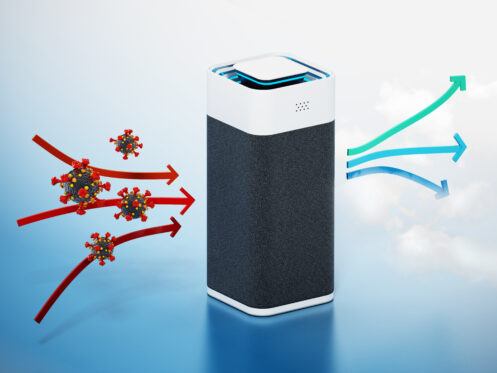Since heating and cooling make up nearly half the utility costs in a typical household, you want to ensure that your HVAC systems are as efficient as possible. Regularly changing out your HVAC air filters is a simple way to save on your energy bills. In addition, clean filters are vital to maintaining the air quality in your home.
HVAC System Efficiency
Your heating or cooling system can become inefficient when its filter becomes clogged with dirt and debris. You can think of this like breathing through a straw. As the airflow to your system gets more restricted, it has to work harder to maintain the temperature you have set on your thermostat, just as you would have to work harder to breathe through a straw. As your system works harder to pump out cool air or heat, it increases your home’s energy usage, which can increase your utility bills. The U.S. Department of Energy estimates that dirty air filters cause households to use 15% more energy than necessary per year when heating and cooling their homes.
Better Air Quality
Your HVAC filter captures dirt, pollen, dust, mold spores, pet dander, and other types of airborne particles when your heating or cooling system is running. They help keep these pollutants out of the air your family breathes. Clean filters are important to protect the health of everyone in your home. However, they are especially vital for those who have asthma and other respiratory conditions that airborne contaminants may aggravate.
Protects HVAC System’s Internal Parts
While HVAC air filters help with indoor air quality, their primary purpose is to prevent dirt and debris from entering the interior of your heating and cooling units. If your filters are not functioning correctly, it could allow grime to build up on some of the sensitive components inside your unit, resulting in damage. A compromised filter could even let through larger objects that could cause significant problems for your equipment.
Consistent Comfort
Dirty filters can cause a host of problems that may interfere with your HVAC system’s ability to keep your home at a consistent temperature. For instance, a clogged filter can cause short cycling. Short cycling is when your system shuts off before completing its heating or cooling cycle. This can lead to higher humidity levels in summer because your air conditioner is not running long enough to remove enough moisture from the air. In addition, during both the hotter and cooler months, short cycling can lead to uneven heating and cooling. Regularly changing your filters can prevent issues that interfere with your HVAC system performing as it should.
Increased HVAC Lifespan
The expected lifetime of most HVAC equipment is between 15 and 20 years. Since clogged air filters adversely affect every part of your HVAC system, changing them out regularly will ensure that your heater or air conditioner lasts as long as it should. Regular maintenance combined with being diligent about air filters will ensure that you do not have to replace your heater or air conditioner prematurely.
Save Money on Repair Bills
Repairs to your system can be costly, depending on what your HVAC professional needs to do to get your system back in working order. For example, costs for fixing or replacing the evaporator coil in an air conditioning unit or blower motor in a furnace can add up. These are examples of some parts that can wear out quickly if you are not replacing your air filters on a regular basis. Air filters for cooling and heating units tend to be relatively inexpensive, and keeping up with this maintenance task can reduce your HVAC repair costs over the long run.
Environmentally Friendly
Along with saving you money, an efficient HVAC system can contribute to creating a greener household. Though you may feel that changing your air filters cannot have much impact on global warming, keep in mind that yours is one household among millions. As more homeowners become aware that better maintenance can reduce their carbon footprints and take action, it will positively impact the environment.
Replacing Your Air Filters
You should read the manual that came with your HVAC system to determine how often you need to change your HVAC air filters. This manual will also tell you the best type of filter and size you need for your system.
If you use a standard pleated or fiberglass filter, the average replacement time is every one to three months. In a household with family members with respiratory issues, you may be using a HEPA or other high-efficiency filter. These usually need to be replaced every three to six months because they capture more airborne pollutants and clog faster.
You should inspect your filters about once a month, no matter what type you use. This is because the recommendations for how often to change your filter are just a guideline. Your filters may get clogged faster and need to be changed more often due to several factors. For example, if there is a cold snap during winter or a heat wave in summer, your heating or cooling system will work harder, and its filters will get dirtier faster. Monthly inspections will allow you to change filters when necessary and develop a sense of a replacement schedule that works for your HVAC system.
Other Factors That Necessitate More Frequent Filter Replacements
In addition to extreme weather and the type of filters you use, several other factors may require replacing your HVAC filters more often.
Pets
Unfortunately, your furry family members contribute to debris build-up in your heating and cooling system’s filters. These HVAC filters capture pet hair and dander. If you have a pet that tends to shed a lot, this could mean you need to change out your filters more often.
Guests
Having a lot of people in your home may make your filter dirty faster. If you host guests during the holiday season or have children who return home for college break, you may have to replace filters more often during these times. This is especially true if people are going in and out a lot since when you open the door, more dirt and outdoor airborne particles can get indoors.
Smoking
If anyone in your home smokes, you may notice that your air filter gets dirty faster. This is because smoking produces chemicals and particles that your air filter captures.
Construction
If you renovate a bathroom or remodel a basement or attic, the process will result in more dirt and dust in the air, which will be captured by your heating or cooling system’s air filters. During construction, you may want to inspect your filters more frequently than once a month and will likely have to change them out more often.
Professional HVAC Company in Lincoln
At John Henry's Plumbing, Heating, Air, and Electrical, we have served Lincoln, NE residents for over 20 years. We install, replace, and repair heating and cooling systems. In addition, we can assist with your electrical and plumbing needs.
Contact John Henry's Plumbing, Heating, Air, and Electrical today if you have questions about how often to replace your air filters or for inquiries about our services.

